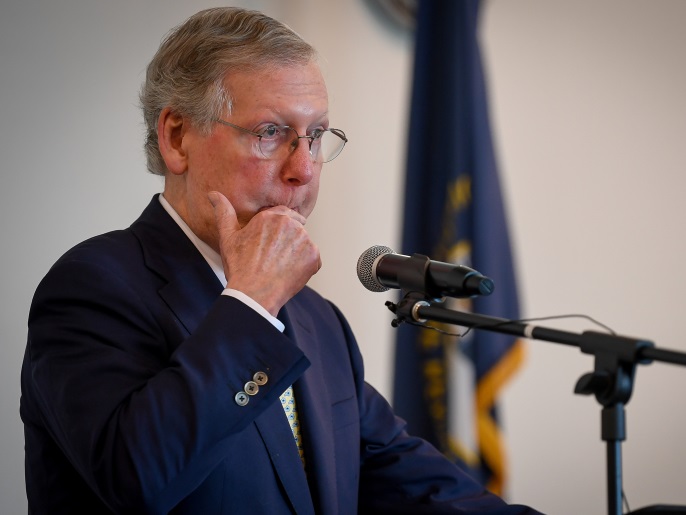The Economist said that an overwhelming majority of Republican politicians do not currently dare to oppose President Donald Trump's claim that he did not win the presidential election despite their conviction that he did not win, thus risking diminishing the American people's confidence in the electoral institutions and in democracy.
In her report, she
explained
that, instead of being honest with themselves and standing up to Trump and his claims that he did not fail in the elections, almost all of them preferred to walk with his dangerous imagination that the electoral process needed an investigation without providing any evidence that the elections went badly.
She noted that as of yesterday, only 4 Republican senators: Susan Collins, Lisa Murkowski, Mitt Romney and Ben Sassi had recognized Biden's victory, and that a few Republican elected officials had congratulated Biden in special ways.
Adult support
The magazine reviewed the various forms of support shown by senior Republican leaders for Trump in rejecting the election result, such as a statement by Mitch McConnell, the majority leader in the Senate, who said that the president "has a 100% right" to contest the result, and send Kevin McCarthy - the leader of the minority in the House - a similar message. And William Barr, Attorney General, instructed federal prosecutors to breach a decades-long agreement and begin investigating "supposedly substantive allegations of voting irregularities and vote scheduling" even before states ratify their election results, and Secretary of State Mike Pompeo spoke of preparing to move to the second Trump administration.
The Economist: Republican Senator McConnell said that Trump has the right (100%) to challenge the election results (Reuters)
Trump self-interests
She said Trump had self-interest in his stance on the election results and that he would cost the country a lot.
She stated that his stance will help him remain in the spotlight and will give him political and financial gains.
Questioning the legitimacy of Biden’s victory is a way to weaken the incoming president and discourage bipartisan cooperation in Congress.
Meanwhile, saying that election officials, poll watchers, or Democrats have cheated is a way to arouse the enthusiasm of his supporters.
This proved useful to him, as a poll conducted by the "Politico / Morning Consult" after the vote ended last week showed that 70% of Republicans do not now believe that the elections were free and fair, while 64% questioned the results, which are much higher numbers than they were. On him in the polls before the vote.
The Economist went on to say that Trump hopes, regardless of the exact path he takes next, in the commercial and political exploitation of such a large volume of supporters, along with those drawn to conspiracies such as "Kiwanon" and his rhetorical festivals activists - the essence of his future political backers and supporters. His family - plus the donors and buyers of Trump-branded merchandise.
Why are they afraid of him?
She indicated that he had just launched a non-partisan political action committee to allow him to collect donations in the post-election period, and it would be easy for this committee to collect a lot of money at this time when his supporters are angry, and that he plans to exert influence on congressional candidates and their primaries. In the coming months and years.
Even the insistence on doomed recounts could bolster Trump personally, she said, as any surplus fundraising to pay the millions needed to recalculate votes in Wisconsin, for example, could be used to pay off other campaign debts.
She added that some Republicans are afraid of breaking with Trump despite losing the presidential election, as he has already achieved a record in the election (more than 71 million), and has expanded his party's attractiveness, for example, among many Latino voters, and led Republicans to Gains in the House of Representatives while limiting losses in the Senate, and many hopefuls to run for the presidency have no representatives for the Republican Party in 2024 to antagonize Trump.
He became a role model for others
His method of demolishing the temple made everyone gain, so he became an example for others.
The two Republican candidates for the Senate in Georgia - who will run in the run-off election next January - have decided to attack the state government, for example, without providing any evidence for their allegations.
Trump has instilled voter agitation by attacking institutions.
Even so, The Economist says Republican politicians' pursuit of Trump's path will eventually stop, but will make a smooth transition of power more difficult and erode confidence in government.
The Economist is not satisfied with these negative expectations of the American political scene, but rather quotes William Kristol, a conservative political analyst, predicting a more radical step in anti-democracy by Trump and his allies in which they try to persuade Republican lawmakers in the states to ignore the voters' wishes and send voters to the electoral college who support Trump instead of Biden.

